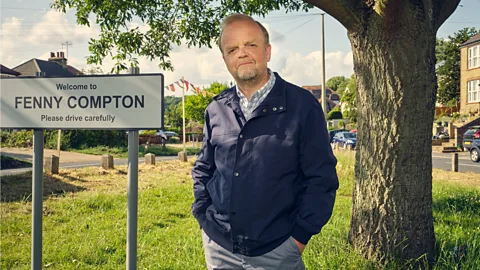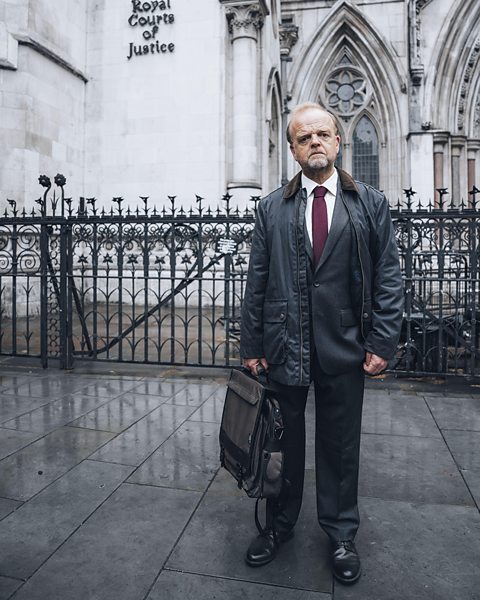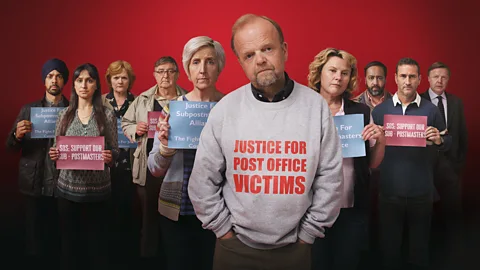Mr Bates vs The Post Office: How a TV drama shook up Britain – in just a week
 ITV
ITVSince a drama about one of the biggest miscarriages of justice in UK history aired last week, more than a million people have signed a petition and the British government have announced a new law. How did a single TV show have this effect?
The impact of a hit TV show has always been difficult to define. Should it be judged on viewership? The critics' response to it, or how many awards it wins? What about how often it's been memed, or the themes that resonated with social media users? This month, a UK TV show went far beyond all of this, when a dramatisation of a real-life British scandal was so effective in portraying a lesser-known miscarriage of justice to the public, that in just a week it moved more than a million people to sign a petition calling for justice for the accused, and prompted the British government to announce a new law.
That TV show is Mr Bates vs The Post Office, a four-part drama that was broadcast for four consecutive nights from 1 January. As the BBC's political editor Chris Mason put it on Wednesday, "Just a week ago the ITV drama … was still on. Here we are, seven days later, and the prime minister stands in front of a packed House of Commons, and says the government will put forward a new law… How extraordinary. The power of drama. The momentum it has generated, the public opinion it has shifted, the government it has galvanised."
More like this:
The series is a semi-fictionalised account of the Post Office Horizon scandal, in which post office branch managers across the UK were wrongly accused of theft and false accounting for almost 20 years from 1999, with more than 700 being prosecuted. The issue was actually the result of faulty software in the Post Office's centralised computer accounting system, called Horizon, which wrongly made it look like money was missing from their branches.
When those accused pointed out that it was an issue with the software, rather than any illegal activity on their part, they were sacked, forced to repay the often huge "losses" and even sent to jail, which included the incarceration of one pregnant woman. The results have since been called the "most widespread miscarriage of justice in UK history" and the true, devastating toll was on the thousands of innocent people involved and their families: they went bankrupt, they lost their homes, marriages split up, and their mental health was destroyed.
 ITV
ITVFor 25 years, a group of these workers – led by Alan Bates (played stoically by Toby Jones in the series) – has fought to clear their names. By 2020, a few of them slowly began to have their convictions quashed, and an inquiry was announced in 2021, but it appeared to be stalling. Then, on the first day of the new year in 2024, British TV viewers switched on a new primetime drama in their millions – 9.2 million, ITV confirms, have now watched – where the decades-long tormented lives of the Post Office workers were taken from the headlines and translated into a shocking yet moving retelling of the true story.
The drama itself was pitched perfectly, tonally and emotionally, by the writer Gwyneth Hughes, which was a key factor in drawing in such a large audience. And while eyes might usually glaze over at the words "computer system errors" or "false accounting", for the first time for a sizeable amount of the British population, the David-and-Goliath-esque scandal was humanised. The emotional toll was played out on screen by some of the UK's well-loved faces, like Jones, Monica Dolan and Julie Hesmondhalgh, as they portrayed so precisely just how the events had the power to ruin so many lives.
Speaking to The Guardian, Hughes said that she created this "direct visceral appeal" to run throughout her drama: "It's for reaching out across the stage or through the screen, grabbing you by the throat and saying: care about me. And when it works, it's incredibly powerful. In this case, it's been put to the service of this terrible event in our country's history. If you want to really get people's attention, tell them a story. And in this case, a true story."
 ITV
ITVHughes' story did more than just attract attention; it galvanised action. The Post Office CEO at the time of the scandal, Paula Vennells, was played so convincingly in the show by Lia Williams, that within days of the finale on 4 January, more than a million people signed a petition demanding she hand back her CBE, given to her by Queen Elizabeth II in 2019. On 9 January, she did just that. And a day later, the Government stepped in. Prime Minister Rishi Sunak said he would bring in a new law to "swiftly exonerate and compensate victims".
Mr Bates is once again proof of the ability of the small screen to change the narrative of real-life events, and when it connects with an audience, what instrumental changes can arise from it. This power was arguably first harnessed back in 1966, when the British drama Cathy Come Home deftly and impactfully brought awareness to the issue of housing and homelessness, which led to the problem being discussed in the House of Commons and the homeless charity Shelter being formed.
The power of drama
Ava DuVernay chose a drama format for her 2019 mini-series, When They See Us, which fictionalised the case of the Central Park Five, five men falsely convicted of rape who eventually had their conviction overturned. Although the men were exonerated in 2002, the series – streamed by 23 million people in the first month – served to highlight the US judicial system failing those accused, and helped to make reparations to the people whose lives were ruined, in the hope it won't happen again. As Vulture's Jen Chaney wrote: "More than anything, this miniseries reminds us that what happened to those five boys three decades ago could just as easily happen today, in the name of what some powerful figures would perceive as justice."
Two recent LGBTQ+ series in the UK and US both took on the Aids crisis of the 80s, Russell T Davies' It's a Sin and Ryan Murphy's Pose, highlighting how the government and the medical services failed to act quickly enough in response to a disease that was killing gay and trans people, and how those who contracted the virus were ostracised and pilloried. In one shocking scene in It's a Sin, a character diagnosed with Aids is physically locked up in a hospital ward, legally, under a Public Service Act of the time. As well as educating a younger generation on the issue – lead actor Olly Alexander told the BBC at the time: "Young gay people can't believe it happened" – it also led to an upsurge in testing, with the Terrence Higgins Trust charity reporting that 8,200 HIV testing kits were ordered in a single day, helping towards the target of ending new HIV cases by 2030.
Pose changed the way that the trans community was received: it's been called "the most groundbreaking LGBTQ+ show ever" and in 2022, Michaela Jae Rodriguez (who played Blanca in the series) became the first ever trans actor to win a Golden Globe. Variety said the impact of the show had "paved the way for better TV representation – in front of and behind the camera".
Meanwhile, the 2021 series Dopesick, about the US opioid crisis and its particularly devastating impact on working-class communities in the Midwest, and the involvement of Purdue Pharma (owned by the Sackler family), tapped into protesters asking major art institutions to reject funding from the family. Following its broadcast on Hulu, New York's Metropolitan Museum of Art announced it would remove the Sackler name from galleries, joining a host of other international museums, galleries and art institutions who previously followed suit.
Whether it's educating a nation on an historical scandal, drawing attention to miscarriages of justice, or achieving real-world change through dramas, it's likely TV commissioners will be spurred into further action following the overwhelming response to Mr Bates from the British public (ITV is in conversation with "international partners" about streaming the drama worldwide). With Peter Kosminsky currently making a series about the 2017 Grenfell Tower fire in London, which killed 72 people, and calls for Britain's infected blood scandal of the 70s and 80s to also be dramatised, there's a chance to right controversial rulings in the present day.
Mr Bates' executive producer, Patrick Spence, told BBC Radio 4 that at this moment in history, engaging true-life stories being retold on TV is a way to channel our emotions and to support people who have been treated as the underdog, which is why we're likely to see more as a result: "We feel unheard by our politicians and by our government. And I think what this drama seems to have done is tapped into that rage. Our ambition was simply to allow them to feel that their story was heard… but what people have connected with I think is a sense that nobody is listening to the people that deserve it the most."
If you liked this story, sign up for The Essential List newsletter – a handpicked selection of features, videos and can't-miss news delivered to your inbox every Friday.
